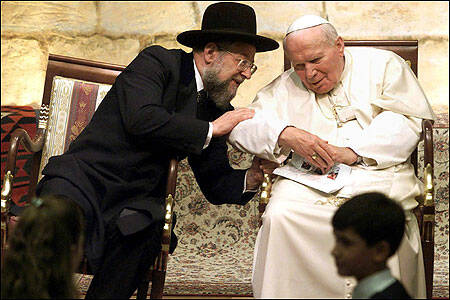Seattle, Washington. — I am here at Seattle University doing some workshops for the School of Theology and Ministry on interreligious learning — this school is a leader in the new wave of interfaith ministerial training — and so I have fallen behind a bit on the news. But a friend sent me the link to the pope’s second interview, with Eugenio Scalfari, founder of La Repubblica. It too is a breath of fresh air and still, so early in this new and new-styled pontificate, a breath of fresh air after the past 35 years of very different papal styles. I was happy to read almost all of these new comments, and grateful for Francis’ new approach. So I am reluctant to raise a couple of concerns that came to me in my reading, but since they have lingered with me since yesterday, I think it apt to pose them here.
First, the pope continues to be critical of the Vatican bureaucracy, the Curia: “Heads of the Church have often been narcissists, flattered and thrilled by their courtiers. The court is the leprosy of the papacy… [Yes,] there are sometimes courtiers in the curia, but the curia as a whole is another thing. It is what in an army is called the quartermaster's office, it manages the services that serve the Holy See. But it has one defect: it is Vatican-centric.” It is a little difficult, even on a second and third reading, to get his distinction between the “leprosy of this court” and the good functions of the curia, it true outward function and its narcissicism. In any case, if the curia, or some part of it, is a blight on the church, and desperately in need of reform and house-cleaning, why does Francis rush to canonize John Paul II, who presided over it, fostered and nurtured it, appointed its officials, and let it be, for 27 years? It is hard to blame “heads of the church” and “elements in the Curia” and to criticize the narcissists and courtiers, without some blame being laid at the feet of this powerful pope who reigned for so long. Whether or not popes should be canonized is open to question; but when they are to be canonized, how well they ran the Vatican itself should be a major criterion, and it is odd that Francis continues the rush to canonize John Paul II when he is so critical of a major dimension of his predecessor's administrative legacy.
Second, later in this second interview, in response to a question about the “minority status” of the church in today’s world, Francis responds in part, “Vatican II, inspired by Pope Paul VI and John, decided to look to the future with a modern spirit and to be open to modern culture. The Council Fathers knew that being open to modern culture meant religious ecumenism and dialogue with non-believers. But afterwards very little was done in that direction. I have the humility and ambition to want to do something.” (My emphasis.)
It is astonishing to suggest that “very little” has been done with respect to ecumenism and dialogue since the council. I readily admit that at least with respect to interreligious dialogue two steps forward have too often been followed by a step backwards. Think of "Dominus Iesus" and the trials of Jacques Dupuis, SJ. Surely there is much more to be done, and further regrets to be expressed. But it is ought not be said, so casually and in passing, that “very little” has been done since the council. Enormous strides have been made in ecumenical exchanges with a wide array of Christian Churches West and East, and through the Pontifical Council on Interreligious Dialogue and other global and local offices and communities, and in the lives of ordinary Catholics everywhere, great strides have been made in altering the church’s previous often arrogant and polemic attitude toward other religions, toward eradicating anti-semitism, toward an opening to our Muslim brothers and sisters, and toward various richer and deeper exchanges with Hindus and Buddhists. So what does Francis mean by “very little” in this regard—what is his measure? Had he done more in Argentina as cardinal?
It could be, to put this in perspective, that in Argentina, as provincial and bishop and archbishop and cardinal, Jorge Mario Bergoglio was not involved in ecumenical and interreligious exchange in any concerted fashion (even if he is respected for fostering Jewish-Christian relations). Perhaps he never entered into encounter with the theologies and practices of the Asian religions, for instance, and did not urge his staff to work at implementing the council’s ecumenical and interreligious vision. Perhaps there was less need in Argentina, and he was too busy to notice what was happening elsewhere in the church. But surely, now that he is pope, he needs to be more careful, more attentive to what others have done and what the church really has achieved in the past 50 years.







